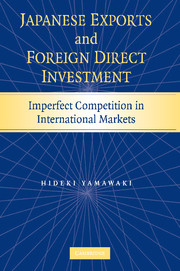Book contents
- Frontmatter
- Contents
- Tables
- Figures
- Preface
- 1 Introduction
- 2 Export Pricing Under Imperfect Competition
- 3 Export Price, Learning, and Domestic Demand Disturbances
- 4 Foreign Market Structure, Export Price, and Profitability
- 5 Competitive Advantage and Export Performance
- 6 Entry in the European and U.S. Manufacturing Industries
- 7 Strategic Interactions in Cross-Market Entry
- 8 Responses of Foreign Firms to Japanese Competition
- 9 Exit in the U.S. Manufacturing Industries
- 10 Interpreting the Empirical Findings
- 11 Implications
- Appendixes
- References
- Index
1 - Introduction
Published online by Cambridge University Press: 08 January 2010
- Frontmatter
- Contents
- Tables
- Figures
- Preface
- 1 Introduction
- 2 Export Pricing Under Imperfect Competition
- 3 Export Price, Learning, and Domestic Demand Disturbances
- 4 Foreign Market Structure, Export Price, and Profitability
- 5 Competitive Advantage and Export Performance
- 6 Entry in the European and U.S. Manufacturing Industries
- 7 Strategic Interactions in Cross-Market Entry
- 8 Responses of Foreign Firms to Japanese Competition
- 9 Exit in the U.S. Manufacturing Industries
- 10 Interpreting the Empirical Findings
- 11 Implications
- Appendixes
- References
- Index
Summary
How do firms compete in international markets? This question is a central concern of modern corporations that operate across national boundaries. Despite its importance, it is only in the past 25 years that economists have addressed this question and offered new theoretical approaches. The field of international economics was the likely candidate to address such a question. Central to the concerns of conventional trade theory, however, was explaining trade patterns by differences among countries in their relative endowments of factors of production. The theory of international trade has depended on the assumption of purely competitive markets. The questions of how firms compete and the effects of interfirm rivalry in international markets were only infrequently addressed within a conventional framework of international economics.
The study of industrial organization, by contrast, addresses explicitly the question of how firms are organized and how they compete in imperfect markets. It does not depend on the premise of a perfectly competitive model but, instead, takes into account real-world frictions such as imperfect information, barriers to entry of new firms into a market, transaction costs, and government policies. Central to the concerns of the study of industrial organization is thus the effect of market structure on behavior and performance, and their interactions. The models of industrial organization proved to be useful, particularly in the economic analysis of multinational corporations, in the analyses of the effects of oligopolistic sellers on international trade, and in determining the effects of international trade on market structure and performance long before a new theory of international trade emerged (Caves, 1971, 1974).
- Type
- Chapter
- Information
- Japanese Exports and Foreign Direct InvestmentImperfect Competition in International Markets, pp. 1 - 25Publisher: Cambridge University PressPrint publication year: 2007



